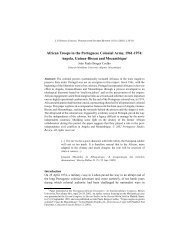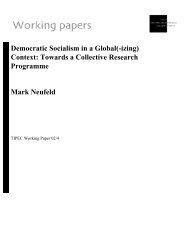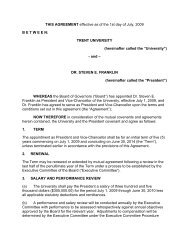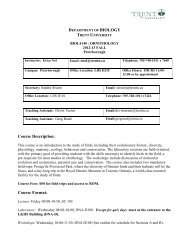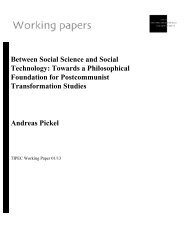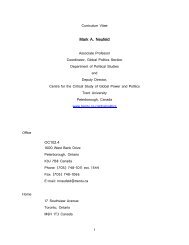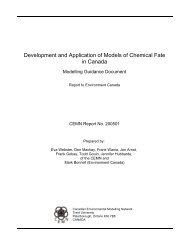AUTHOR COPY - Trent University
AUTHOR COPY - Trent University
AUTHOR COPY - Trent University
Create successful ePaper yourself
Turn your PDF publications into a flip-book with our unique Google optimized e-Paper software.
Conceptualizing holism in international interdisciplinary critical perspective<br />
and allopathic medicine to improve population health. Given that the basis of<br />
holistic philosophy is unity and oneness, a health-care system that incorporates<br />
the most effective aspects of various systems of medicine would have powerful<br />
potential to improve population health on many levels. If practitioners were to<br />
also take social inequities into account, this integrative health-care could truly<br />
become a means for individuals to take action for wellness, as well as a means<br />
to create structural changes toward equitable resource distribution. I have<br />
written elsewhere (Shroff, 1996) about a health-care system that incorporates<br />
public health approaches and integrates best practices from multiparadigmatic<br />
medical systems.<br />
This article also reviewed the interdisciplinary nature of the concept of<br />
holism, illustrating the philosophical and scholarly unity in the notions of unity<br />
and oneness, interconnection, inseparability of mind and body. Modern physics,<br />
particularly quantum mechanics, is at the forefront of the scientific frontier<br />
that has arrived at the same conclusions as philosophical ideas from Hinduism,<br />
Buddhism, Indigenous, African and other cosmologies. Systems science, an<br />
interdisciplinary enterprise, is also part of this movement away from a reliance<br />
on reductionist thinking.<br />
Although holistic thought-forms are ancient, they have modern applications.<br />
One of the most significant applications are holistic health practices that are<br />
re-emerging the world over. This article has explored the underlying context of<br />
this resurgence.<br />
About the Author<br />
Farah M. Shroff, PhD, is a public health researcher, educator and activist. She<br />
teaches at the <strong>University</strong> of British Columbia’s Medical School. She has a<br />
keen interest in Health for All and divides her research program into: a) social<br />
justice issues related to health and b) holistic health: mind/body approaches<br />
to health. She has written about Ayurveda, yoga, naturopathy, midwifery,<br />
nursing, health advocacy, HIV/AIDS and more.<br />
<strong>AUTHOR</strong> <strong>COPY</strong><br />
Note<br />
1 Marti Kheel (1989) warns that Hippocrates’ contributions are often idealized as holistic. She<br />
argues that Hippocratic ideas marked the beginnings of a dualistic mentality that separated<br />
mind and body, human being and nature. She notes that in Hippocratic medicine, the patient’s<br />
symptoms were aggravated to the point of a healing crisis. Purgings, bleedings, induced<br />
vomitings and other ‘heroic’ feats were used in this task. ‘The notion of “aiding” nature had<br />
already led to the practice (by male physicians) of giving her a “helpful” shove. Meanwhile,<br />
r 2011 Macmillan Publishers Ltd. 1477-8211 Social Theory & Health Vol. 9, 3, 244–255<br />
253




